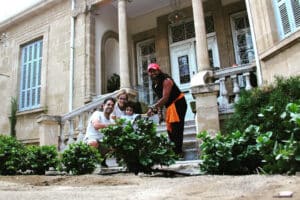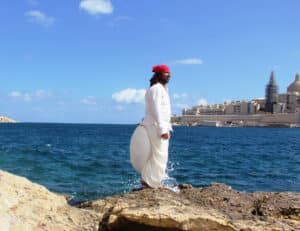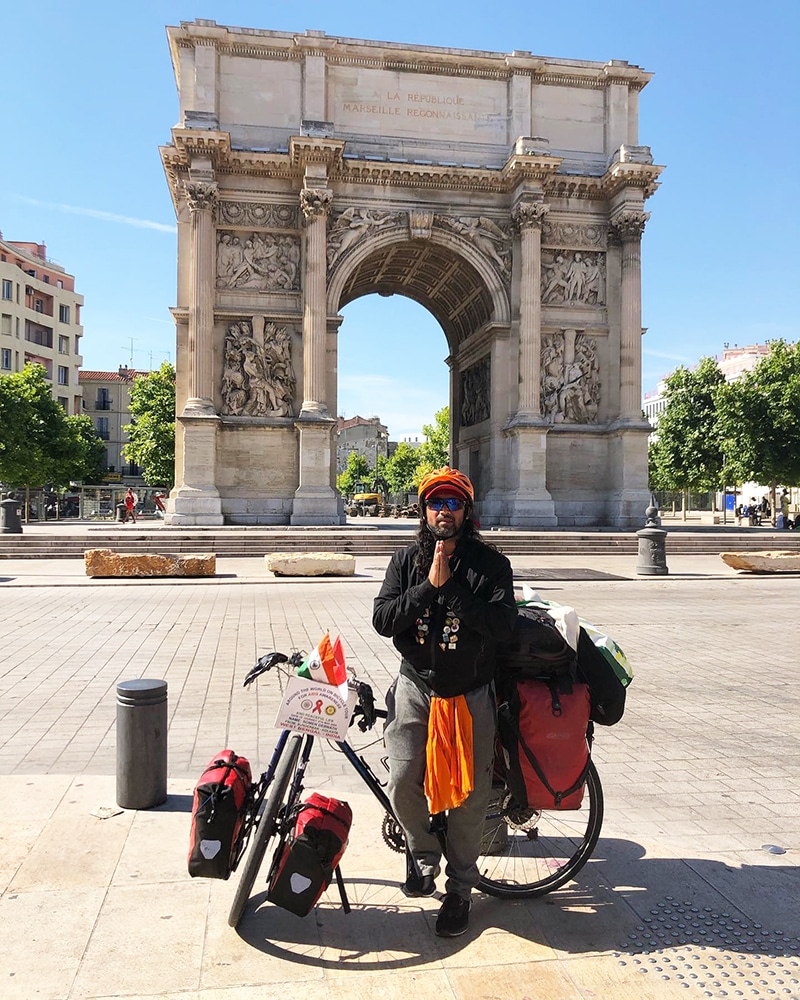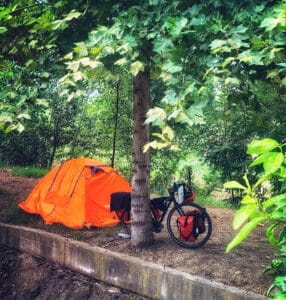On a sometimes dangerous journey through 191 countries that has taken 18 years, THEO PANAYIDES meets an activist on a mission
A man on a bike – or actually next to a bike, greeting me warmly in Eleftheria Square in Nicosia. The bike is a good bike, a $2,000 Salsa, but nothing too unusual. The man, Somen Debnath, is more unusual, having been travelling around the world on the bike (or previous incarnations of the bike) since 2004. Cyprus is the 169th country he’s visited – though, by the time you read this, he’ll have moved on to the 170th (Saudi Arabia). After that it’ll be a long flight (it’s unclear if he’ll cycle part of the way) to Fiji, Samoa and Tonga, then Australia, south-east Asia then, finally, back to India, a couple of years later than anticipated due to Covid. “It is one journey,” he explains. “191 countries, one trip.”
Man and bike join me for a coffee at Pieto, on Ledra street. Somen locks the bike a little way down the crowded street, not (as I expected) right next to him, where he could keep an eye on it. I’m surprised by his nonchalance – the bike, after all, is his “mission” – but he just shrugs pleasantly. Has he ever had a bike stolen, on his travels? “Three times,” he reports: “Bulgaria, Poland and Germany”. The Polish experience led to a friend starting a Facebook event, which in turn garnered thousands of responses: “1000 people wanted to give me their own bike”. In the end, the prime minister of Poland intervened (!) to buy Somen a new bike, “and I continued my journey”.
It’s an interesting tale – not least for what it says about his status. I’d expected to find some scruffy hippy, but not at all: his beard is neatly trimmed, his clothes clean, his teeth strong and very white. The flag of India flutters proudly on the bike’s handlebars, just above a sign reading ‘Around the World on Bicycle Tour for Aids Awareness’. Somen has “credentials”, he tells me – and brings out a letter from the Indian High Commission in Cyprus, attesting to his general good character. The Indian embassy in Malta (his 168th destination) got in touch with the one here, and ours will presumably pass him on to the one in Riyadh. He works very closely with embassies – and indeed, when I ask if he’s made many friends on the road, he mentions the acting high commissioner in Malta whom he’s now met three times over the years, previously in Frankfurt and Trinidad & Tobago.

in Nicosia
He makes friends with locals too, of course, indeed his manner is extremely open; right from the start, he behaves as if we’ve known each other forever. Friendship is “a silent gift of Nature,” he explains in slightly idiosyncratic English. “Always I try to make friends… and also positively invite them to India.” Somen is a kind of ambassador himself, promoting India and global friendship in general – not to mention his official goal, to raise Aids awareness – as a kind of quid pro quo for the help he receives; his funding comes almost entirely from Indian communities and companies, with the embassies acting as a liaison. He set out on his round-the-world trip with support from five government ministries, having previously travelled “the length and breadth of India, 28 states” assisted by the various state governors.
It all began in May 2004, two days after he’d acquired his Bachelor’s degree in Zoology from the University of Calcutta. He was then in his early 20s (he’s now 39, according to Wikipedia), a young man from the village of Basanti – 80km south-east of Kolkata – with a hankering to travel, inspired by a book he’d read in childhood called Amar Bharat Amar Bharat, ‘My India Is a Great India’. He roamed around India for two years, having picked the bicycle as his means of transport because it was cheap, eco-friendly and “the ultimate yoga” as he puts it, then came up with the idea for a 16-year, round-the-world project. Somen’s background is quietly middle-class (his dad owned a garment shop) but his most salient trait seems to be a penchant for visionary Big Ideas: his future plan – once the bike trip is over – is to build a “global village” in India, an “ecological and sustainable village” that’ll feed and house 250 people (50 will be interns doing the work to keep the village going, the other 200 will be guests from around the world). “That is my next project,” he declares, sipping a coffee with milk at Pieto. “That will be my 10-year project.”

in Malta
Our coffees come with individual bottles of water – and the small bottles are sealed but I notice that he tips back the bottle, without touching his lips, when he drinks the water, a reminder that round-the-world travel comes with certain precautions. He’s had bad experiences over the years, most recently in Malta just weeks before our interview where – as he rather remarkably claims – “somebody put me poison”, leaving him incapacitated for almost a week. (It wasn’t just food poisoning, someone deliberately tried to injure him; he knows who it was, claims Somen, but prefers not to say.) He’s also been attacked or beaten up 18 times, both in Africa and Europe: “Black people thought I was white, and white people thought I’m black. If I’m brown, what can I do?” – but his worst mishap was undoubtedly being captured by the Taliban in 2009, a near-death experience that made headlines (‘Taliban captive won his release by cooking curry’ wrote the Telegraph) all over the world.
“They found me on the road,” he recalls. “I was travelling from Kabul to Herat [in Afghanistan], and after 146km I was caught by them from the road.” It was just random bad luck, says Somen – though it surely didn’t help that he must’ve been carrying his usual credentials from the Indian government. Did his captors plan to kill him? “Maybe kill, or maybe they think they can take some money. They were curious about me.” He was beaten with rifle-butts, then blindfolded and bundled into the back of a Jeep. “It was really quite dangerous,” he recalls with nice understatement. “I didn’t think that I would be released by them. I’m thankful that they released me.”
The Taliban kept him prisoner for 24 days. “First four days I was continuously starved and beaten.” At that point, fortunately, a translator appeared, so he could at least communicate with his captors. “They asked me, ‘What do you think about Koran?’. I told them that I read all the religious books, and also Koran.” He actually had a Koran in his bag, which undoubtedly made a good impression. “Then they asked, ‘What if we don’t let you go?’. I said, ‘You can give me some job. I cannot take a gun and go to the war to fight others – but I can cook, I can clean your house, I can wash your clothes’.”
Somen became a cleaner for the Taliban, then a cook, cooking the life-saving curries mentioned in the Telegraph piece – though the real breakthrough, he claims, came when he started talking about his “mission”, to cycle around the world raising awareness. (Whether this ideological argument struck a chord with the Islamists – or whether they’d just realised by then that he was a small fish with no hostage potential – is a moot point.) “I have an individual mission,” he told them. “I respect my mission… So many people have their own missions, and we should respect each other. So that’s how I came to convince them.”

in Marseille
Somen Debnath is indeed a man on a mission; that, as already mentioned, seems to be his temperament, thinking in terms of grand visions. (After the ‘global village’ – which should take 10-15 years – he has yet another project planned, globe-trotting again but this time staying in universities working on creative endeavours, one month at a time.) His Wikipedia page refers to him as an “Indian activist” – not just a traveller – and of course he spends a lot of time visiting schools and hospitals, spreading health awareness, on his various travels. At one point he mentions People House in Kolkata, a kind of all-purpose help centre which “we” built, ‘we’ being presumably some NGO he’s involved with. (So much for the scruffy hippy.) He’s even something of a landscape artist – he did a Fine Arts course after the Zoology – and paints a painting for every place he visits, doing his best to encapsulate it; post-trip, he says, this collection “will travel around the world for two years, and after that it will be auctioned”. Another big project.
Everything becomes a Big Idea, that’s just his style. His journey is a case of the five ‘D’s, he says, reeling them off on his fingers: “It became my Dream, Decision, Determination, Discipline and Dedication”. Yet there are also mundane, practical issues: what to eat, for instance. “I keep cucumber, carrot, apple, chips and cheese,” he replies, declaiming them as he did the five ‘D’s. “That is my staple food when I am on the road.” They don’t seem like the most obvious foods for long-distance cycling – not much in the way of carbs or glucose – but “I feel that it is good for me”.

Somen’s tent
Where does he sleep?
“I sleep in my tent,” he shrugs. “I sleep in hostels, I sleep in some little hotel – or sometimes some people’s house.”
Doesn’t he miss having his own bed?
“I don’t miss it… I never think in my life that I need a bed, or something like that. I have a tent, so my tent is my home. So wherever in the world I put my tent, that becomes my home, my country, my world.”
What about emotional needs, though? What about love?
Love is important, he admits, “but it’s a different way of love. To come close to people, it is also a way of love. But it’s different love, it’s platonic love or spiritual love. I believe in spiritual philosophy”.
Doesn’t he miss romantic love?
“No, I really don’t miss it. Because I’m satisfied in my life. I’m happy with what I have. So when you are happy, then you can share a happiness with others.” It may sound selfish, muses Somen, but the best way to help others is ultimately to help – to fulfil – yourself, even when the path seems unconventional. “It is very important to recognise our own way of happiness. [Otherwise] we go to illusions, and ultimately find nothing. We find just emptiness. That’s why I believe, better to be yourself.”
He’s had setbacks, over 18 years; even just the fact that it’s taken 18 years is a setback, since the trip was supposed to end in 2020. (Instead he got stuck in New Zealand for a year, during Covid.) He’s had bad experiences, but in fact they mean nothing: “Bad experiences will come and go, because it is life. Life is like reading a heartbeat – it’s like a pacemaker, up and down. If it’s straight, then it is not life!”. Bad experiences may even be good experiences, because people – meaning the racists and skinheads who’ve attacked him over the years – only change when they learn, he explains, so just by being present he’s helped them learn that other people also exist in the world. “We are all human,” says Somen, “but a lot of times we are missing our humanity.” Another big idea.
The countries tend to bleed into each other. Georgia was an unexpected highlight, they even gave him honorary citizenship; living with native tribes – 48 tribes in Africa, including the Zulu and Masai, plus about half that number in the Amazon – was an experience. He also became the first person ever to cycle, officially at least, in Antarctica (the governor of Ushuaia in Argentina made the arrangements), though of course it was something of a stunt; you can’t really cycle very far in Antarctica. In the end, it doesn’t matter: he’s not a tourist, after all, not even really a traveller – he’s an idealist, a secular missionary. The mission is all, spreading awareness and just being there: “We need more people to meet each other in this world”.
Somen is indeed an unusual person. He’s a visionary, even potentially a megalomaniac – yet in fact “I don’t have expectations,” he assures me. He’s enjoyed our chat but expects nothing from it, after all (he says) he’s already done 5,000 interviews all over the world. He meets experience head-on, without hope or fear; 18 years of travel have taught him humility, and perhaps humanity. “I always wanted to lead a different life,” he muses. “Life is a mission – duty, duty and duty!” We finish our coffee, then go our separate ways – I walking back to my car, and he of course on his bike.







Click here to change your cookie preferences